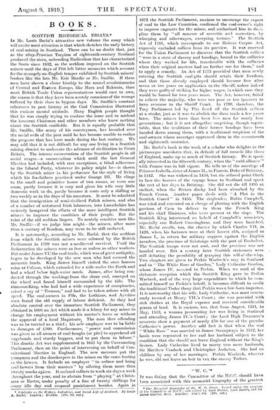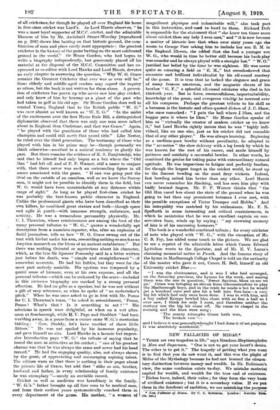"W. Ca . '*
IT was fitting that the Committee of the M.C.C. should have Leon associated with this memorial biography of the greatest
• The Memorial Biography of Dr. W. G. Grace. lamed under the auspices of the Commiree of 1.C.C., and edited by Lord Ifawke, Lord Irani% awl Sir ;Imo Cordon. Bart. London: Con,ti.ble. 121r. net.' oi ail cricketers, for though he played all over England his home in frrat-class cricket was Lord's. As Lord Harris observes-, "he was a most loyal supporter of M.C.C. cricket, and the admirable likeness of him by Mr. Archibald Stuart-Wortley [reproduced on p. 208] shows him batting on that historic ground, the combination of man and place strrelymost appropriate : the greatest cricketer in the history of the game batting on the-moat celebrated ground in the world." Sir Home Gordon, who had begun to write a biography independently, but generously placed an his material at the disposal of the M.C.C. Committee and has cooperated as co-editor with Lord Hawke and Lord Minis, devotes an early chapter to answering the question, "Why W. G. Grace remains the Greatest Cricketer that ever was or ever will be." Some elderlyand middle-aged readers may regard the inquiry as otiose, but the book is not 'written for them alone. A generation of cricketers has grown up who never saw him play cricket, and only knew of him by hearsay as a giant of the past who had taken to golf in his old age. Sir Home Gordon does well to remind Young England that to the British public "W. G." was once almost as well known as "W. E. G." "In the midst of the excitement over the first Home Rule Bill, a distinguished diplomatist observed that there was only one man more talked about in England than Gladstone, and that was Grace." Again, "he played with the grandsons of those who had called him champion and could still merit that prated title." Like Nestor, he ruled over the thirdgeneration. The testimony of those who played with him in his prime may be—though personally-we think otherwise—ascribed to a natural tendency to glorify the past. But there remains the evidence of K. S. Ranjitsinhji, who said that he himself had only begun as a bat where the "Old Man" had left off, and of P. F. Warner, still a name to conjure with, that there never was such an outstanding figure in all senses associated with the game. "If one was going past the Oval on the outside of an omnibus, well as we knew the Surrey men, it might not be possible to identify them in the field, but W. G. would have been unmistakable at any distance within range of sight." As long as he played first-class cricket he was probably the best-known public character in England. Unlike the professional giants who haree been described as their own kilfers,...he combined great stature and bulk—though spare and agile in youth—with immense strength, endurance, and activity. He was a tremendous personality physically. Mr. C. I. Thornton, whose reminiscences are among the best of the many personal tributes to W. G.," quotes a wonderfully apt description from a nanieless reporter, who, after an explosion of florid journalese, tells us how "W. Cl. Grace swung out of the tent with his bat under his arm, resembling nothing so much as an Assyrian monarch on the frieze of an ancient entablature." But there was nothing Oriental or mysterious about his character, which, as the late Sir Spencer Ponsonby said in a letter written just before his death, was "simple and straightforward "—if somewhat eccentric. He had his foibles, but they were for the most part entirely amiable. His egotism was tempered by a genial sense of humour, even at his own expense, and all the personal tributes—which can be reckoned by the score—included in this variontin biography are marked by a strong personal affection. He had no gifts as a speaker, but he was not without a gift of racy utterance, as when he spoke of "an undertaker's pitch." When he was once asked to go in first with Mr. Posno for C. I. Thornton's team, he asked in astonishment, Posno, Posno ! What's that ? Is it something to eat ? ' " His solecisms in speech were delightful, as when on a wet afternoon at Scarborough, while H. V. Page and Stodtlart "had been warbling away, in a pause from a corner came W. G.'s stentorian bidding : Now, Stoddy, let's have another of those little
dittoes.' " He was not spoiled by his immense popularity, and gave himself no airs. Lord Hawke in a laconic but impressive Introduction pays "W. G." the tribute of Baying that he found the man as attractive as his cricket ; "one of his greatest charms was that he was always the same and never had his head turned." He had the engaging quality, also, not always shown by the great, of appreciating and encouraging aspiring talent. The editors warn us that there is nothing in their pages about the private life of Grace, but add that "alike as son, brother, husband and father, in every relationship of family existence he was exemplary "—surely an enviable record.
Cricket as well as medicine was hereditary in the family.
W. " father brought up all four sons to be medical men, and from their earliest years systematically coached them in every department of the gamy. His mother, "a woman of
magnificent physique and. indomitable will," also took part in this instruction, and: used to bowl to them. Richard Daft is responsible for the statement that" she knew ten times more about cricket, than any lady I ever met," and "it is now become a matter of historic lore that when over sixty years ago she
wrote, to George Parr asking him to include her son E. M. in the England Eleven, she added thatshe had a younger son W. G., who would in time be better still because his back-play wassounder and he always played with a straight bat." "W. G." justified her belief by the time he was eighteen. He was newer quite so ama,zing a field, as "E. M.," but overshadowed that eseentrie and brilliant individualist by his all-round mastery
of the game. It is true that he lacked the elegance and grace of many famous amateurs, and the magnetic charm of his brother "G. F.," a splendid all-round cricketer who died in his thirtieth yeas-. But in force, resourcefulness, imperturbability,
knowledge of the game, and evergreen vitality he towered over all his compeers. Perhaps the greatest tribute to his skill as a batsman is the historic and often-quoted dictum of J. C. Shaw, who once remarked : "I puts the ball where I likes, and the beggar puts it where he likes." Sir Home Gordon speaks of him as "virtually the creator of modern cricket as we know it," but Lord Hawke rightly insists that he was "highly indi
vidual, like no one else, just as his cricket did not resemble that of any other player." He was always learning. Beginning as a medium-pace bowler without peculiarity, he adopted in the " seventies " the slow delivery with a leg break by which he was known for the rest of his career, and made himself by patience and assiduity a successful bowler. In other words, he combined the genius for taking pains with extraordinary natural aptitude. He was impervious to fatigue and perfectly fearless, for though the largest target in the cricket world, he stood up to the fiercest bowling on the most fiery wickets. Indeed, fast bowling suited him better than any other. Lord Harris can never remember his flinching, and has seen him play with badly bruised fingers. Mr. P. F. Warner thinks that "the Old Man cared less about the state of the grousid when he was going to bat than any prominent batsman I ever met, with the possible exceptions of Victor Truraper and Hobbs." And his intrepidity was matched by his enthusiasm. Mr. F. R.
Spofforth in some interesting and critical reminiscences, in which he maintains that he was an excellent captain on con
servative lines, winds up by saying : "my crowning memory of him is of his unceasing keenness."
The book is a wonderful combined tribute ; for every cricketer of note who played with "W. 0.," with the exception of Mr.
C. B. Fry, has added some touch to the picture. We are glad to see a reprint of the admirable letter which Canon Edward
Lyttelton wrote to the Spectator, and of Mr. E. V. Lucas's cluaraing memorial notice in Punch. And the famous story of the hymn in Marlborough College Chapel is told on the authority
of the master who gave it out, Canon H. Bell, himself an old University cricket Blue :—
" I was the choirmaster, and it was I who had arranged, on the Saturday previous, the hymns for the week, and among them was the one in question, ' Sweet Saviour, bless us ere we go.' Grace was bringing an eleven from Gloucestershire to play the Marlborough boys, and in the train he made a bet he would get a hundred runs and also hit aball into Sun-lane—a very big hit which had only once been done. I was in with him, and a boy called Kempe beaded him clean with as fine a ball as I ever saw; I think for only 3 runs, andtherefore neither the century nor the big hit came off. He came to chapel in the evening and the lines were sung :
The scanty triumphs Grace bath won, The broken vow '
and I believe it was generallythought I had done-it of set purpose. It was absolutely accidental."



































 Previous page
Previous page